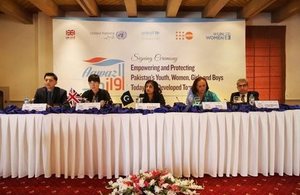The UK and UN launch Aawaz II programme to empower and protect Pakistan’s youth, women and children
The United Kingdom’s Department for International Development (DFID) will provide £17.25 million to the United Nations (UN) in Pakistan to implement a five-year (2018-22) programme, AAWAZ II.

Left to Right: Mr Jamshed M. Kazi: Representative UN Women, Ms. Joanna Reid: Head of DFID Pakistan, Dr Asma Haider: Member Planning Commission of Pakistan, Ms Aida Girma: UNICEF Representative in Pakistan and Mr Hassan Mohtashami: Representative UNFPA during the launch of AAWAZ II
AAWAZ II will empower and protect Pakistan’s youth, women, girls and boys who are too often exploited and too often left behind. An agreement to this effect was signed today between Ms. Joanna Reid, Head of DFID Pakistan and Ms. Aida Girma, UNICEF Representative in Pakistan, at a ceremony chaired by Dr. Asma Haider, Member (Social Sector and Devolution) Planning Commission of Pakistan.
AAWAZ II will work with government and local communities to promote the rights of children, youth and women. The programme has a particular focus on the issue of child labour, to which marginalised groups are extremely vulnerable. The programme will reach 7 million people across the provinces of Khyber Pakhtunkhwa (KPK) and Punjab. It will build on the success of its predecessor, AAWAZ I: Voice and Accountability Programme.
Speaking on the occasion, Dr. Asma Haider said:
I really appreciate the approach adapted by the UN network for joint development and implementation of multi-year development programme in consultation and conjunction with the Government of Pakistan.
We hope that it will contribute to the Vision 2025, the Five-Year Plan 2018-23 and the 2030 Development Agenda.
Speaking at the event, DFID Head Joanna Reid said:
The UK and Pakistan have both made a promise to eradicate child labour by signing up to the first universal set of Sustainable Development Goals, the SDGs.
The Aawaz II programme is an essential component of that success. Together, we can drive the change that is needed at every level of society. Under Aawaz II, we will work to protect vulnerable and marginalised groups. No longer will they be invisible. No longer will their voices not be heard.
In his message for the occasion, the UN Resident Coordinator, Mr. Neil Bunhe said:
By helping include children, women and youth in Pakistan’s development, this joint programme will benefit all Pakistanis by reducing inequality – a key Sustainable Development Goal.
Aawaz II will be implemented jointly by the United Nations Children’s Fund (UNICEF), United Nation’s Fund’s Population Fund (UNFPA) and UN Women. UNICEF focuses on overall strengthening of child protection systems and building the capacities of families, communities and the government to promote rights of children for protecting them from all sorts of violence and abuse.
UNFPA’s goal is to help women make informed decisions and choices pertaining to their lives including reproductive rights, thereby facilitating a demographic transition in Pakistan. UN Women focuses on strengthening the capacity of gender equality advocates to help Pakistan fulfil its gender equality commitments. UN Women work in Pakistan with a focus on children, youth and women through various interventions at the national and provincial level.
Representatives of the provincial governments, Mr. Hassan Mohtashami, Representative UNFPA; Mr. Jamshed M. Kazi, Representative UN Women and Ms. Aida Girma, Representative UNICEF) and officials of the British High Commission in Pakistan were also present on the occasion.
Further information
There is an urgent need in Pakistan to take action on child labour, exclusion, abuse and exploitation. Aawaz II programme will work across the Pakistani provinces of Khyber Pakhtunkhwa and Punjab to:
- strengthen institutions to improve laws, policies and data on modern slavery, child labour, child marriage and violence against women and girls
- provide safe spaces for members of communities who are too often left behind through a network of 450 Aagahi Centres (women friendly advice bureau)
- bring communities together to raise their voices and call for action on issues like child labour, early and forced marriage and inter-faith harmony
- identify risks of conflict using a network of trained women, transgendered people, men and youth to work directly with communities to identify and address potential triggers of conflict and promote tolerance, particularly towards religious minorities
- develop the evidence base for action through evaluation of programme outcomes and evidence generation
More Information
For updates on the British High Commission and for more information on the Chevening Programme, please follow our social media channels:
- Twitter: @UKinPakistan, @ChevPakistan, @tomdrewUK
Contact
British High Commission
Islamabad
tel. 0092 51 2012000